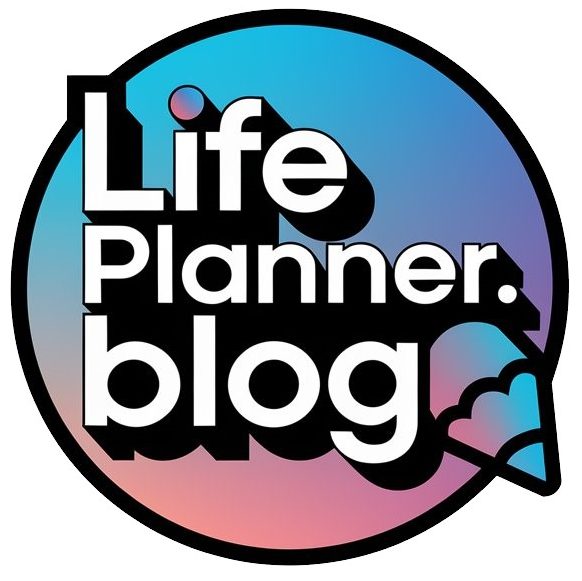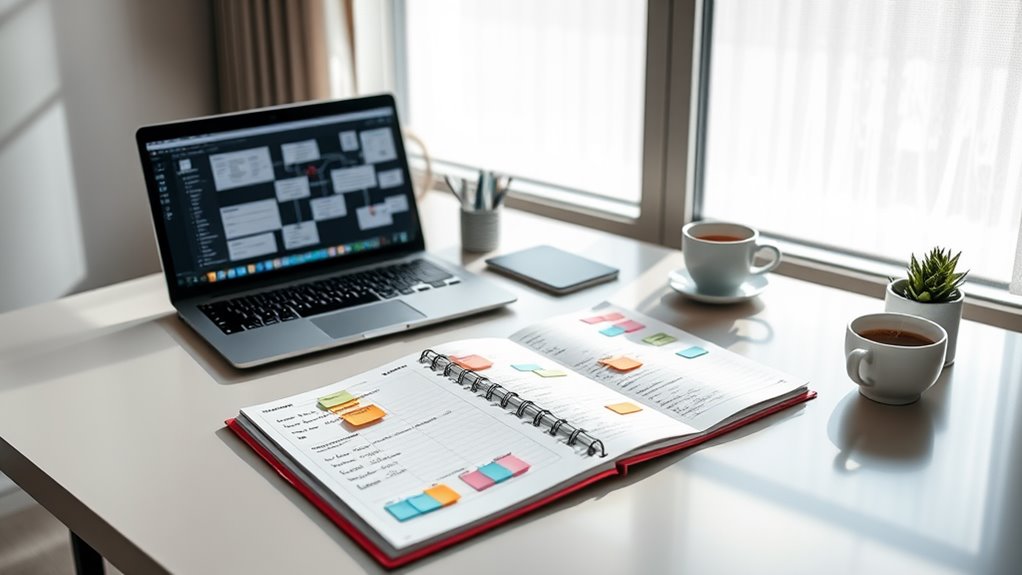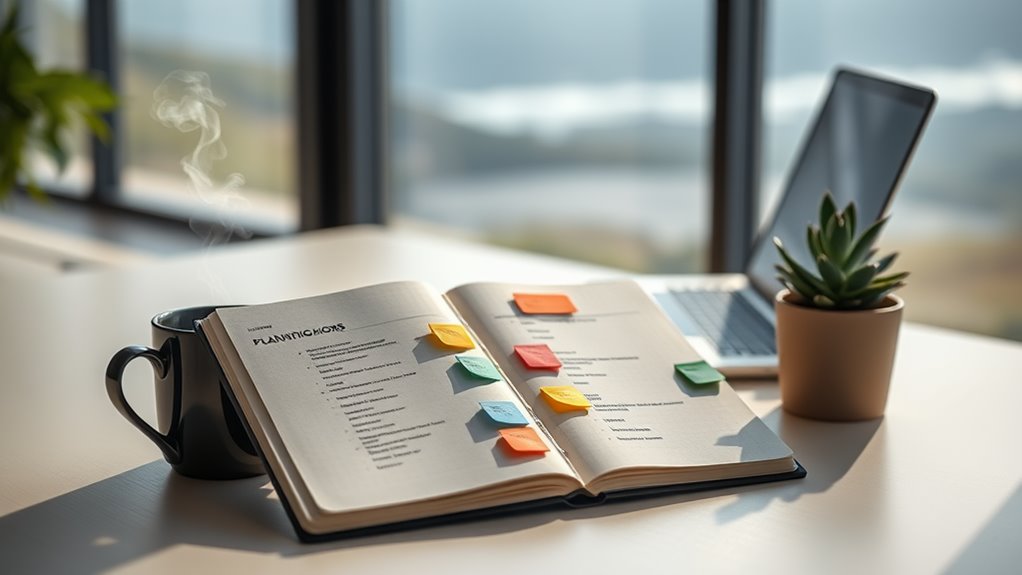The Smart Planning Framework Every Successful Person Uses
Every successful person uses a smart planning framework that starts with setting clear, specific goals using the SMART criteria. They manage their time effectively by breaking tasks into smaller steps and setting deadlines to create urgency. Prioritizing tasks through methods like the Eisenhower Matrix helps them focus on what truly matters. Accountability systems, such as sharing goals with mentors, keep them on track. Finally, they embrace continuous improvement, regularly evaluating progress and adapting as needed. This structured approach fuels their success, and there’s much more to discover about these strategies that can elevate your own planning.
Key Takeaways
- Successful planning begins with setting SMART goals that provide clarity and direction for actions.
- Break down larger goals into smaller, manageable tasks to maintain focus and reduce overwhelm.
- Utilize effective time management techniques, such as scheduling and setting deadlines, to enhance productivity.
- Regularly review and adjust plans based on progress assessments to stay aligned with objectives.
- Establish accountability systems by sharing goals and tracking progress with mentors or peers for motivation.
Goal-Setting Techniques
Goal-setting techniques are essential tools for anyone looking to achieve success. By setting clear, specific goals, you create a roadmap that guides your actions and decisions.
Start by defining your objectives; make them measurable so you can track your progress. Use the SMART criteria—Specific, Measurable, Achievable, Relevant, and Time-bound—to refine your goals.
Break larger goals into smaller, manageable tasks, and prioritize them to keep yourself focused. Regularly review and adjust your goals as needed to stay aligned with your aspirations.
Celebrate your achievements, no matter how small, to maintain motivation. Remember, setting goals isn’t just about reaching the finish line; it’s about the journey and growth you’ll experience along the way.
Effective Time Management
While you may have clear goals in mind, effective time management is essential to turn those aspirations into reality. You need to make the most of each day by organizing your tasks and minimizing distractions.
Here are four strategies to enhance your time management skills:
- Set specific deadlines**** for each task to create a sense of urgency.
- Break tasks into smaller steps to make them more manageable and less overwhelming.
- Use a planner or digital tool to schedule your day and visualize your commitments.
- Review your progress regularly to assess what’s working and adjust your plans accordingly.
Prioritization Strategies
Effective prioritization is essential, especially when juggling multiple tasks and deadlines. Start by identifying your most critical tasks using the Eisenhower Matrix: categorize them into urgent and important, important but not urgent, urgent but not important, and neither. This helps you focus on what truly matters.
Next, use the ABCD method—assign a letter to each task based on its priority. ‘A’ tasks are top priority, while ‘D’ tasks can be delegated or eliminated.
Additionally, set specific time blocks for high-priority tasks to minimize distractions. Regularly review and adjust your priorities as needed, ensuring you stay aligned with your goals.
Accountability Systems
To achieve your objectives, establishing accountability systems is essential. These systems help you stay focused and committed to your goals.
Here’re four effective ways to implement accountability in your life:
-
Set Clear Goals****: Define specific, measurable, achievable, relevant, and time-bound (SMART) objectives.
-
Track Progress: Use tools like journals or apps to monitor your advancements regularly.
-
Share Your Goals: Tell friends, family, or colleagues about your objectives to create external accountability.
-
Schedule Regular Check-ins: Set up weekly or monthly meetings with a mentor or coach to review your progress and adjust as needed.
Continuous Improvement Methods
Establishing accountability systems lays the groundwork for effective continuous improvement methods. You should regularly assess your progress and identify areas needing enhancement.
Embrace feedback from peers and mentors; their insights can illuminate blind spots you mightn’t see. Implement small, incremental changes rather than overwhelming overhauls. This approach fosters adaptability and resilience within your planning framework.
Track your results meticulously, using data to gauge the effectiveness of each adjustment. Celebrate your successes, no matter how minor, as they motivate you to keep pushing forward.
Remember, continuous improvement isn’t a one-time effort; it’s an ongoing journey. Stay curious and open-minded, and always look for ways to refine your processes.
With commitment and the right mindset, you’ll achieve lasting success.
Frequently Asked Questions
How Do I Stay Motivated During Challenging Times?
Staying motivated during challenging times requires focus on your goals, celebrating small wins, and surrounding yourself with positive influences. Remind yourself why you started, and take breaks to recharge your energy and perspective.
What Tools Can Enhance My Planning Effectiveness?
To enhance your planning effectiveness, use digital tools like task management apps, calendars, and note-taking software. Break tasks into smaller steps, set deadlines, and track progress to stay organized and focused on your goals.
How Do I Adapt My Plan When Circumstances Change?
When circumstances change, you should reassess your goals and priorities. Identify new challenges, gather relevant information, and adjust your strategies accordingly. Stay flexible and open-minded, so you can pivot effectively and maintain progress.
Can I Use This Framework for Personal and Professional Goals?
Absolutely, you can use this framework for both personal and professional goals. It helps you clarify objectives, adapt to changes, and stay focused, ensuring you make consistent progress in all areas of your life.
How Do I Celebrate Achievements Without Losing Focus?
To celebrate achievements without losing focus, you can set aside time for reflection and gratitude. Acknowledge your progress, reward yourself with small treats, and quickly refocus on your next goals to maintain momentum.





